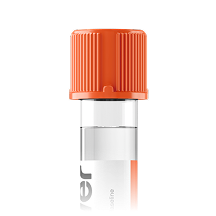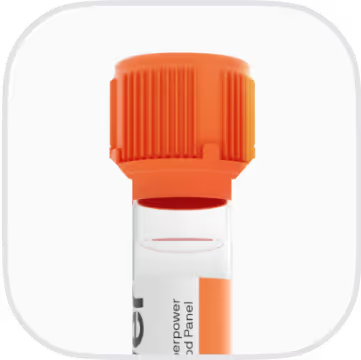Key Benefits
- Measure fasting insulin to gauge insulin resistance and overall metabolic health.
- Spot early insulin imbalance before glucose, A1c, or weight changes appear.
- Guide personalized diet, activity, sleep, and medication choices to improve sensitivity.
- Protect heart and liver by flagging insulin‑driven dyslipidemia and fatty liver risk.
- Support PCOS care and fertility by identifying insulin resistance impairing ovulation.
- Support pregnancy planning by informing gestational diabetes risk and need for early monitoring.
- Track progress; falling fasting insulin shows improved sensitivity and lower future risk.
- Interpret results most appropriate with fasting glucose to calculate HOMA‑IR, plus A1c and lipids.
What is a Cardio IQ Insulin blood test?
Cardio IQ Insulin blood testing measures the amount of insulin circulating in your blood. Insulin is a protein hormone (peptide) made by beta cells in the pancreas (islets of Langerhans). Rising blood sugar prompts these cells to process a precursor (proinsulin) and release insulin, along with C-peptide, into the circulation. The result represents how much insulin your pancreas is putting out at that moment.
Insulin’s main job is to move glucose from the bloodstream into muscle and fat cells (via GLUT4 transporters), while telling the liver to store glucose as glycogen and to reduce new glucose production (gluconeogenesis). It also shifts the body toward building and storage—promoting fat synthesis (lipogenesis) and protein synthesis, and restraining fat breakdown (lipolysis). Measuring insulin therefore reflects the balance between pancreatic output and tissue demand for this signal—a window into insulin signaling activity and metabolic load that shapes energy use, body composition, and cardiovascular metabolism.
Why is a Cardio IQ Insulin blood test important?
Insulin is the body’s fuel traffic controller. Made by the pancreas, it ushers glucose into muscle and fat, tells the liver when to store or release energy, and signals blood vessels, kidneys, and the brain. A Cardio IQ Insulin test shows how hard your pancreas must work at baseline—often revealing hidden insulin resistance years before glucose or A1c change. In most adults, fasting values sit in a low-to-middle range; when glucose is normal, “within reference ranges” tends to be on the lower but clearly detectable end.
When insulin is low, it can mean excellent insulin sensitivity—muscle and liver respond readily, energy is steady, and symptoms are absent. But if insulin is low while glucose runs high, the issue may be inadequate pancreatic output (beta-cell failure), as in type 1 diabetes, advanced type 2, or pancreatic disease, with thirst, frequent urination, weight loss, or ketones. In pregnancy, unusually low insulin despite rising insulin resistance suggests poor beta-cell compensation. In children, very low insulin with hyperglycemia raises concern for autoimmune diabetes.
When insulin is high, tissues are resisting the signal, so the pancreas compensates. People may notice post-meal fatigue, strong hunger, weight gain around the waist, or darkened neck/axilla skin. System effects include fatty liver, atherogenic lipids, endothelial dysfunction, kidney sodium retention and higher blood pressure. In women, it can drive PCOS; in men, visceral adiposity and low testosterone; in teens, puberty raises baseline but marked elevation signals risk; in pregnancy, excessive levels track with gestational diabetes risk.
Big picture: fasting insulin sits upstream of glucose control, lipid metabolism, blood pressure, and inflammation. Persistently elevated levels predict fatty liver, type 2 diabetes, and cardiovascular disease, making this test a powerful early lens on metabolic and vascular health.
What insights will I get?
A Cardio IQ Insulin test measures the amount of insulin circulating in your blood, typically in the fasting state. It reflects how much your pancreas is secreting and how sensitive your tissues are to insulin. Because insulin governs glucose use, fat storage, vascular tone, and hormone signaling, it links directly to energy, metabolism, cardiovascular risk, cognition, reproductive function, and immune balance.
Low values usually reflect low demand because tissues are very insulin‑sensitive or reduced pancreatic output. They can be seen with prolonged fasting or very low carbohydrate intake, and in undernutrition. When secretion is inadequate (as in autoimmune beta‑cell failure or advanced type 2 diabetes), low insulin coexists with high glucose and signals impaired fuel delivery. In pregnancy and childhood, unexpectedly low insulin with hyperglycemia warrants attention.
Being in range suggests pancreatic output is well matched to need and that insulin is effectively ushering glucose into muscle and controlling liver glucose release. This pattern supports metabolic flexibility, stable energy, favorable lipids, and calmer vascular signaling. For fasting measurements, metabolic health often aligns with values toward the lower end of the reference interval in insulin‑sensitive adults.
High values usually reflect compensatory hyperinsulinemia from insulin resistance in muscle, liver, and fat. This state promotes atherogenic lipids, elevated blood pressure, fatty liver, inflammation, and weight gain around the abdomen. In women it often accompanies ovulatory dysfunction consistent with polycystic ovary syndrome. Higher values also occur in late pregnancy and during puberty; rare tumors can cause very high insulin with low glucose.
Notes: Interpretation depends on fasting status, recent illness, stress, and timing. Glucocorticoids, atypical antipsychotics, beta‑agonists, niacin, and insulin‑stimulating drugs shift levels. Assays differ; some detect insulin analogs variably. Values are most informative alongside glucose and other cardiometabolic markers.


.svg)









.avif)



.svg)





.svg)


.svg)


.svg)

.avif)
.svg)










.avif)
.avif)



.avif)







.png)

.avif)


